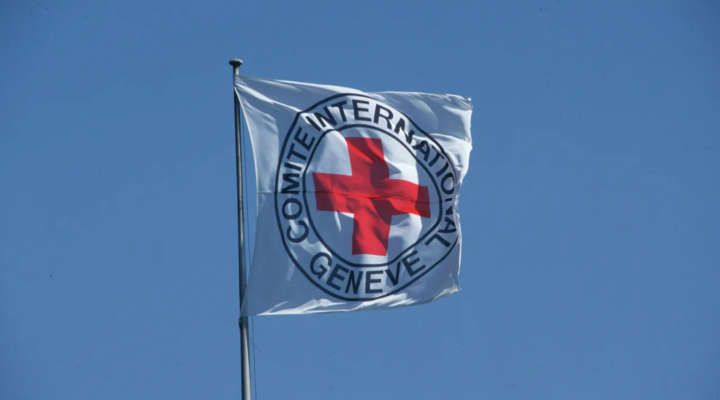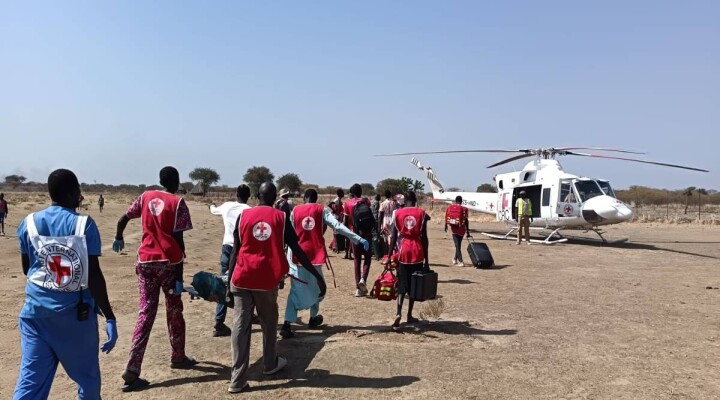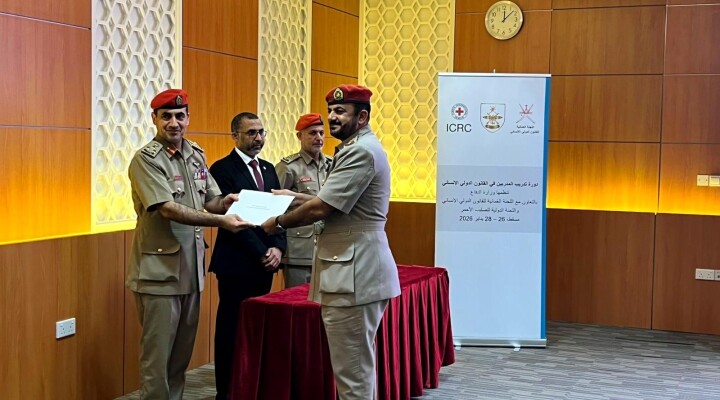Gaza’s Youth: Suspended lives, fading opportunities
A new online survey conducted by the International Committee of the Red Cross (ICRC) found that 9 out of 10 young people from Gaza who took the survey believe their lives are abnormal.
Two thirds of the respondents said they are dependent on their families for income, whilst 40% reported having no hope of finding a job opportunity in the next 15 years.
One-fifth of the Gaza population are youth aged between 18 and 29 years old. The majority of the youth who responded to the ICRC’s survey believe that the next phase of their lives will continue to be defined by the same critical challenges they have faced in recent years.
“Wars and closure have negatively impacted all youths in Gaza, not just me. War is just bad enough as it is, adding the closure to that makes it too much to bear,” Laith Rashdan, a 25-year-old university graduate, told the ICRC.
Fifteen years of restrictions imposed by Israel on the movement of goods and People in and out of Gaza have significantly contributed to a steady deterioration in the economic and humanitarian situation in Gaza. This has limited access to essential services, jobs and opportunities outside of the occupied Palestinian territory.
“The needs of youth go beyond the economic dimension in Gaza, as half of the young people say that they have endured significant mental health issues and one-third of them face social problems. Youth residing in Gaza desperately need a pathway towards hope and opportunity away from pain and suffering driven by hostilities and movement restrictions,” said Nicolas Geeraert, the deputy head of the ICRC’s sub-delegation in Gaza.
A sustainable and long-term solution that provides youth in Gaza with dignified opportunities lies in the hands of the authorities responsible for the multiple rounds of hostilities and movement restrictions. The ICRC calls on them to immediately address the deepening humanitarian consequences that prevent access to essential services as well as contribute to mental health challenges and rising unemployment amongst youth in Gaza.
“All we ask for is to live normally like others worldwide. We want to be able to move freely, travel, and have decent jobs,” Nouran Al-Zaeem, 23, told the ICRC.
Note to editors
The ICRC’s survey about youth in Gaza was conducted between 18 July and 03 August 2022. The ICRC conducted the online survey via its Arabic Facebook page titled “The ICRC in the Occupied Territories”, which has +100K followers, to measure what 15 years of restrictions on the movement of goods and people have left on the lives of youth in the Gaza Strip. The sample of respondents was randomly selected from across the Gaza Strip governorates. The study approach was a 5-7-minute questionnaire in Arabic. The sample included 385 participants who fall within the age group of 18-30 years old, which is representative as per the methodology followed in the survey.
Established in 1863, the ICRC operates worldwide to help people affected by conflict and armed violence and to promote the laws that protect victims of war. As a neutral, independent and impartial organization, its mandate stems essentially from the Geneva Conventions of 1949. it is based in Geneva, Switzerland, and works in more than 100 countries.
For more information and to arrange interviews, please contact:
Suhair Zakkout (occupied Palestinian territory): szakkout@icrc.org or +972 599 255 381
Tali Shamir (Tel-Aviv): tshamir@icrc.org or +972 524 160 917
Imene Trabelsi (Beirut): itrabelsi@icrc.org or +961 3 13 83 53
Gaza’s Youth: Suspended Lives, Fading Opportunities –Survey Key Findings
- The General Environment for Youth:
- 8% of the respondents consider life in Gaza to be abnormal compared to other communities mainly because of:
- the repercussions of repetitive rounds of hostilities.
- the closure and movement restrictions.
- internal Palestinian differences.
- climate change.
- 6% of the respondents reported that they are negatively impacted by the humanitarian situation in Gaza due to:
- low-income level and lack of jobs,
- lack of access to basic services, including constant power outages, poor quality of water and wastewater services, and malnutrition.
- the impact of cyclic rounds of escalations.
- Economy:
- Both the lack of financial independence for young people and their acceptance of any job opportunity even if it does not suit them were considered as the most important repercussions of the economy’s deterioration (69.9% of the votes).
- 8% of the respondents consider life in Gaza to be abnormal compared to other communities mainly because of:
- Health
- Mental Health: 49% of Gaza youth endure stress, anxiety & depression, 34.5% reported social problems with their social ties, 12.4% abstain from marriage.
- Quality health services is impacted:7% reported a decline in the access to quality medical services due to limited capabilities of the medical centers, 33.6% cannot afford healthcare, 27.7% could not access quality health care due to restrictions on receiving treatment abroad.
- Restrictions on movement of people and goods:
- Lost a job opportunity abroad, 39.2%.
- Unable to leave Gaza for a business opportunity, 20.6%.
- Denied of access for better treatment. 2%.
- Missed a scholarship abroad. 12.9%
- Weakened social ties and narrowed prospects for establishing a family, 11.1%.
How Gaza Youth perceive their future in the next 15 years?
- 9% believe they have no hope in getting a job opportunity in the next 15 years.
- 5% believe there will be new rounds of escalations in the future, while 19.2% think there is a 50% chance of new hostilities.
- 8% have a little hope that travelling mechanisms from and into the Gaza Strip will improve, while 33.5% are hopeless about it.
- 2% believe they will not have electricity on 24-hour basis.
- 4% expect to witness new generations of internet services in Gaza, 23.4% expect the opposite.
SHOTLIST
On-screen credit ICRC
Duration: 04:59
Country/Location - Gaza City
Shooting date 14.09.2022
Language – Arabic
Producer - Hisham Mhanna/ICRC
Copyright / Details of restriction if applicable – None
00:00:00 – 00:00:03
High view of Gaza City.
00:00:04 – 00:00:08
People walking down one of Gaza’s main streets.
00:00:08 – 00:00:17
A young man sitting alone by the seaside in Gaza.
00:00:18 – 00:00:19
Young men hanging out and playing cards at a seaside cafeteria.
00:00:19 – 00:00:47
General shots of humming generators and cables that people connect privately to their houses during blackouts.
00:00:48 – 00:01:00
Shots of a leather-repair shop in the main souk of the old city in Gaza.
00:01:01-00:01:07
Interview with Yassin Haboub, 29-year-old tailor.
“Our jobs have become seasonal. I work during the high season only.”
00:01:08-00:01:12
“I receive customers for a couple of days during eid holidays and stay home the rest of the year.”
00:01:12-00:01:20
“I was born in 1993. What have I experienced during my lifetime compared to others?”
00:01:21-00:01:27
“We grew up knowing nothing but isolation and restrictions. We can’t move, work or start a business.”
00:01:27-00:01:29
“Ever since the closure was imposed, we’ve been living in darkness.”
00:01:30-00:01:41
“Many days during the week, we’re connected to electricity only after 14:00. Our business day is over by then. We rely on generators during these days.”
00:01:42-00:01:52
“The repeated rounds of escalation have impacted us economically and emotionally. You don’t need to ask anyone in Gaza how they’re feeling, you can see it in their eyes. Mental health has deteriorated for everybody here.”
00:01:53-00:01:58
“We’re daily workers. We can put food on the table at the end of the day only if we work that day.”
00:01:58– 00:02:06
General shots of the Rafah crossing in the south, crowded with travelers waiting to cross.
00:02:06-00:02:10
Luggage carts left by the Rafah crossing terminal as travelers wait to cross.
00:02:11-00:02:15
Taxis transporting travelers at the Rafah crossing terminal, carrying their luggage on top of the cars.
00:02:16 – 00:02:22
Interview with Nouran Al-Zaeem, 23-year-old university graduate.
“When we talk about crossing borders, we call it ‘the journey of torment’.”
00:02:22 – 00:02:27
“I’ve travelled before and after the closure was imposed.”
00:02:27 – 00:02:32
“Before the closure, a trip out of Gaza would start and end on the same day.”
00:02:33 – 00:02:40
“Nowadays, the trip takes more than three days… three exhausting days. It’s tragic!”
00:02:41 – 00:02:48
“My parents live abroad. I wish I could see them. We can’t meet because of the closure.”
00:02:49 – 00:02:58
“All we ask for is to live normally like others worldwide. We want to be able to move freely, travel, and have decent jobs.”
Interview with Yasmin Abu Halima, 26-year-old graduate.
00:02:59 – 00:03:06
“I received a scholarship to study abroad, but I lost it because I didn’t get my permit and the borders were closed.”
00:03:07– 00:03:14
“I couldn’t attend the evaluation exam. I missed the opportunity.”
00:03:15– 00:03:19
“This was my first reality check after graduation.”
00:03:25-00:03:25
A child pulling a small cart on wheels, and people walking down the street in Gaza.
00:03:26-00:03:28
General view of the souk in Gaza, and two women buying candies from a market stall.
00:03:29-00:03:31
A young hawker selling boiled corn on a stall at a park in Gaza.
00:03:32-00:03:36
A corner set up by a group of youth for renting remote control toy-cars at a park in Gaza.
00:03:37-00:03:45
Shots of young vendors standing behind their stalls to sell soft drinks at a park in Gaza, hoping for more customers to come.
00:03:46-00:03:52
Youths hanging out near the university campus in Gaza City.
00:03:53-00:03:58
Youths selling lupin beans and chickpeas in one of Gaza’s main streets.
Interview with Hind Selmi, 20-year-old student.
00:03:50-00:04:06
“There are many new graduates in Gaza and not enough jobs for them, including myself.”
00:04:07-00:04:17
“We feel like we’re trapped here. We are not motivated to accomplish anything...”
00:04:18-00:04:36
General shots of night life in Gaza during a blackout.
Interview with Laith Rashdan, 25-year-old graduate.
00:04:37-00:04:41
“Electricity supply is very limited. We get blackouts more than we do light.”
00:04:42-00:04:46
“Electricity supply is vital, but it’s become almost impossible to have it all the time.”
00:04:47-00:04:50
“Wars and closure have negatively impacted all youths in Gaza, not just me.”
00:04:50-00:04:55
“War is just bad enough as it is, adding the closure to that makes it too much to bear.”
ENDS



